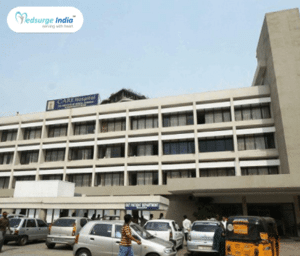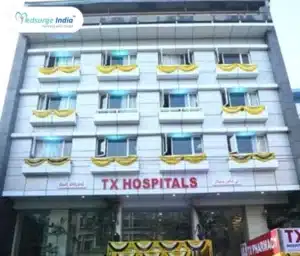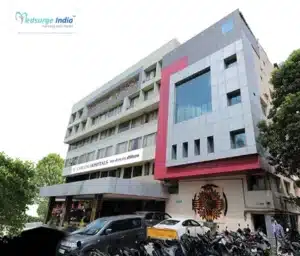Cardiomyopathy Treatment Cost in India
Unlock Exclusive Discount : Your Gateway to Premium Healthcare with Medsurge India Health Value Card.

Unlock Exclusive Discount : Your Gateway to Premium Healthcare with Medsurge India Health Value Card.


Cardiomyopathy is a term used to describe diseases that affect the heart muscle. It is a condition in which your heart is unable to adequately pump blood to the rest of your body. As a result, you can feel tired, short of breath, or have heart palpitations. This disease got worsens with time. Cardiomyopathy Treatment can help you live a better life by slowing the progression of your disease.
People with cardiomyopathy who have no symptoms or signs may not require therapy. Dilated cardiomyopathy that develops quickly may go away on its own in certain cases.
In some cases, treatment is required. The type of cardiomyopathy you have, the severity of your symptoms and problems, as well as your age and overall health, all influence your treatment.
Cardiomyopathy is a term used to describe disorders that affect the heart’s myocardium (heart muscle). Cardiomyopathy causes scar tissue and causes your heart to stiffen, expand, or thicken. As a result, your heart is unable to adequately pump blood throughout your body.
Cardiomyopathy can cause your heart to weaken over time, leading to heart failure. Treatment for cardiomyopathy may be beneficial. Cardiomyopathy can lead to the need for a heart transplant in some persons.
Causes of Cardiomyopathy depend on a variety of things, including coronary heart disease and some medications. All of these can result in an irregular heartbeat, heart failure, a problem with the heart valves, or other issues.
The importance of medical therapy and follow-up care cannot be overstated. They can aid in the prevention of heart failure and other problems.
The following are the most prevalent types of cardiomyopathy:
Some cardiomyopathies do not fit well into any of these categories. These are some of the conditions:
You may acquire other cardiac problems if your cardiomyopathy worsens, such as:
The signs and symptoms of cardiomyopathy are often the same. In all situations, the heart is unable to efficiently pump blood to the body’s tissues and organs. It can cause a variety of symptoms, including:
The causes of cardiomyopathy are frequently unknown. However, in some people, it is caused by another condition (acquired) or is passed on from a parent (inherited).
The following are some of the health issues or activities that might lead to acquired cardiomyopathy:
Your doctor will examine you and ask you questions about your medical history, both personal and family. You’ll also be asked when your symptoms appear, such as whether exercise triggers them. If your doctor suspects you have a heart-related issue, he or she may order the following tests to confirm the diagnosis of cardiomyopathy:
Treatment for Cardiomyopathy differs depending on how damaged your heart is as a result of cardiomyopathy and the symptoms you are experiencing.
Some people may not need treatment until they develop symptoms. Others who are experiencing shortness of breath or chest pain may need to make lifestyle changes or use medications.
Cardiomyopathy is not curable or reversible, although it can be managed with the following strategies:
The goal of cardiomyopathy treatment is to keep your symptoms under control. Treatment also decreases the progression of the condition. Regular checkups will be performed to monitor your heart's health. Your healthcare provider may recommend:
Cardiomyopathy can be life-threatening, and if serious damage develops early on, it can lower your life expectancy. It's also a progressive disease, which means it becomes worse with time. Treatments can help you live longer. They can do this by reducing the deterioration of your heart's state or by giving technologies that assist your heart in performing its functions.
Cardiomyopathy patients should adopt many lifestyle changes to optimize their heart health. These may include the following:
Sticking to a regular workout routine is one of the most difficult tasks. For someone with a compromised heart, exercise can be quite exhausting. Exercise, on the other hand, is critical for maintaining a healthy weight and extending cardiac function. Check with your doctor before beginning a regular fitness regimen that is not too difficult but gets you moving every day.
The optimal workout for you will be determined by the type of cardiomyopathy you have. Your doctor will assist you in determining an appropriate fitness program and will inform you of any danger signs you should be aware of while exercising.
A: High blood pressure that has been there for a long time. A previous heart attack, coronary artery disease, or a heart infection are all conditions that impact the heart (ischemic cardiomyopathy) Obesity makes the heart work more difficult. Misuse of alcohol for a long time.
A: With proper care, many patients with cardiomyopathy can live long and happy lives. We always evaluate the least invasive technique first when offering treatment. Implantable devices, procedures, and surgeries are among the options, which vary from lifestyle assistance and pharmaceuticals to implantable devices, procedures, and surgeries.
A: Cardiomyopathy is not curable or reversible, although it can be managed with the following strategies: adjustments in lifestyle that are good for the heart Prescription drugs, such as those used to manage high blood pressure, prevent water retention, maintain a regular heart rhythm, prevent blood clots, and reduce inflammation.
A: For most patients with cardiomyopathy and heart failure, daily mild exercise is safe and can help them manage their symptoms. It can lower heart rate and blood pressure over time. Your heart expert can recommend an exercise regimen that is ideal for you. Walking, cycling or jogging are all options.
A: After a heart attack, the heart is unable to regenerate heart muscle, and scar tissue replaces the missing cardiac muscle.

Interventional Cardiologist
Clinical Director
17+ Years
Care Hospital, Bhubaneswar
View Doctor
Interventional Cardiologist
Clinical Director
25+ years
Care Hospital, Bhubaneswar
View Doctor
Interventional Cardiologist
Clinical Director and Head of Department
36+ years
Care Hospital, Bhubaneswar
View Doctor
Interventional Cardiologist
HOD & Senior Consultant
17+ years
Meitra Hospital, Calicut, Kerala
View Doctor
Interventional Cardiologist
Senior Consultant
25+ years
Care Hospitals HITEC City
View Doctor
Interventional Cardiologist
Senior Consultant
10+ years
Care Hospitals HITEC City
View Doctor
Interventional Cardiologist
Director & Senior Consultant
22+ years
Care Hospitals HITEC City
View Doctor
Interventional Cardiologist
Senior Consultant
25+ years
Care Hospitals HITEC City
View Doctor
Interventional Cardiologist
Senior Consultant
28+ years
Baby Memorial Hospital
View Doctor
Interventional Cardiologist
Senior Consultant
14+ years
Baby Memorial Hospital
View Doctor









By using our site, you agree to our Terms and Conditions, Privacy Policy and Refund Policy. Medsurge India provides reliable healthcare information and treatment options to support informed decision-making. Our content is designed to support and complement the guidance of your treating doctor, helping you feel informed and confident throughout your healthcare journey. We also Accept International Payments.

Copyright © 2025 NSM ONLINE SOLUTIONS PRIVATE LIMITED. All rights reserved.